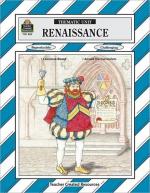|
This section contains 427 words (approx. 2 pages at 300 words per page) |

|
The Renaissance's emphasis on enjoyment of this life and de-emphasis on the afterlife found its initial expressions in art, politics, literature, science, and religion. But eventually, these principles were translated into details of the daily lives of the average person—some for better, others for worse.
A major casualty of the Renaissance ideals was feudalism, the medieval institution in which monarchs granted nobles land in exchange for their political loyalty, particularly in battle. The nobles in turn granted peasants the right to live on and work the land in exchange for payments of goods and money. The severe hardships of the peasants' daily life, for which they saw little return, made them less appreciative of the church's teachings to accept earthly burdens as the price of admittance into heaven. This was especially true in light of the vast amount of corruption they witnessed in...
|
This section contains 427 words (approx. 2 pages at 300 words per page) |

|




